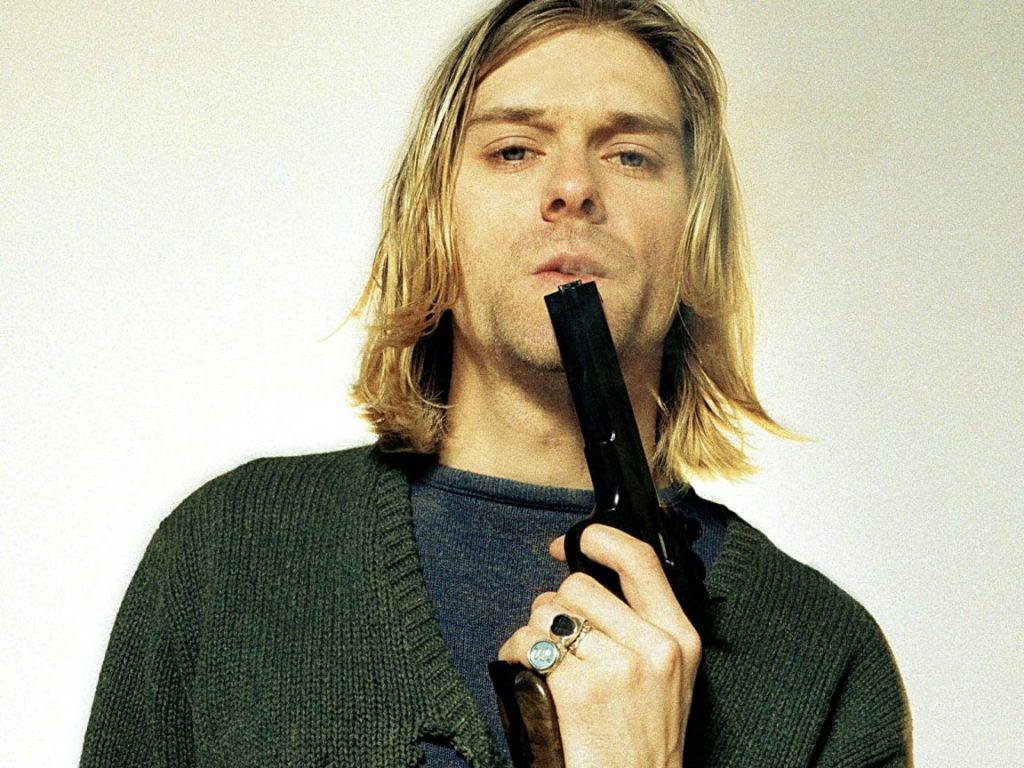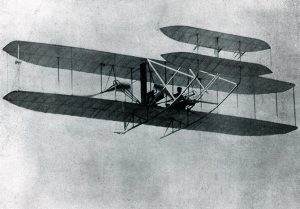“I’m not afraid of dying. Total peace after death, becoming someone else is the best hope I’ve got.” This statement made by Nirvana front-man Kurt Cobain reflects both the self-loathing and general sorrow, or anguish, that he felt he was constantly suffering from and ultimately what led to the tragic event that occurred on April 5, 1994. Kurt Cobain, the lead singer of the band Nirvana, was born in Hoaquiam, Washington on February 20, 1967.1 Few honestly know of the struggles Kurt had to endure in his life, such as his parents’ divorce when he was about nine. This break-up resulted in Kurt losing a permanent place of residence, leaving him in a constant state of borderline homelessness. As a matter of fact, Kurt even resorted to staying at the hospital where he was born around the age of nineteen.2 Regardless, Kurt still managed to climb from rock bottom to become the star he was: the lead singer of Nirvana and the face of grunge music for many people worldwide.

Of course, Nirvana didn’t come straight out the gate making hits nor score international shows. The band Nirvana actually had quite a macabre or fuzzy rise in comparison to other bands. Interestingly enough, Nirvana didn’t even start off being called Nirvana. This small trio actually bounced around with abstract names for quite a few years. From their humble beginnings in Aberdeen, Washington, in 1987 the band was known as Skid Row, Pen Cap Chew, and Bliss all within the same year.3 They played a few house parties and even fewer shows at real venues around the Aberdeen area, but the band life was more of a hobby to the group. They had fun doing what they did, played their hearts out when they had to, but they didn’t really think they were going to be anything huge when they first started out.
The group may have started small, but the effort and time they put into the band would soon enough pay off. In 1989, they released their independent album Bleach, which got them a lot more shows in lots of new places. The band finally started “blowing up” and gathering many followers nationwide. With this newfound momentum, Nirvana signed with Geffen Records and released their second album Nevermind, which has since become legendary. This was just two years after their first independent album Bleach was released.4 Nevermind kicked off Nirvana’s international rise to a new high, scoring them not only shows around the country, but in other countries as well. Nirvana went global and this new, dissonant, and muddy type of rock music started receiving mainstream recognition. This new and quickly popular genre became known and recognized as grunge, a form of punk rock with the muddy sounds of post-punk mixed with a sprinkle of youthful angst.5 This new genre became the sound of the ’90’s, with many bands such as Soundgarden, Pearl Jam, and Alice in Chains riding the wave. But for many worldwide, songs such as “Smells Like Teen Spirit” or most of the songs from Nirvana’s Nevermind album became grunge anthems that depicted the youthful rebellion and dissonance reflected in grunge music.6

Although Nirvana was finally blowing up and rising to international fame quickly, the lead singer Kurt Cobain was still not truly satisfied with his life. Throughout his life, Cobain constantly suffered from stomach illnesses. In response to this constant illness, Kobain would abuse drugs like heroin, claiming it would cure this problem. Even worse, when Kurt met his soon to be mother of his child Kourtney Love, his heroin abuse only got worse.7 With more money and fame, his addiction grew stronger and the pressures of fame and fortune began mounting on his shoulders, until one day it was just too much. In 1994, while on tour in Europe, Kurt had to be hospitalized for drug overdose and other health issues including alcohol problems. Soon after, he was forced to cancel the tour and return back home to Seattle. His family and friends decided to stage an intervention and convince him to admit himself into rehab, much to his displeasure. This rehabilitation did not last long, as Kurt decided to flee the rehab center and return back home to Seattle, tragically unbeknownst to his family and friends. On April 8, 1994, an electrician found Kurt Cobain’s dead body in a room above the garage above his home where he was hiding out at.8 The cause of death was a self-inflicted shotgun blast to the head, and even worse, heroin was found in his system so it’s not even clear if Cobain really meant to do that to himself or if the drugs influenced him to do so.9
Cobain’s inconceivable and unanticipated death resulted in worldwide mourning over the loss of this young artist’s life. Family and friends, especially his girlfriend and daughter, were heavily affected by this tragedy, as well as all of his listeners. Cobain was an icon for Generation X. He gave voice to the youthful generation of people that felt they were dealt a bad hand. He encouraged the generation, and became “the poster boy for grunge.” After Kurt’s death, the grunge scene died down quickly. Of course, there were still other bands in the genre putting out a few successful albums, but the genre never saw the fame and glory it had during its heyday in the early ’90’s, when Nirvana was contributing to the movement.10 The genre died out as quickly as it was born, with the untimely and very unfortunate death of a very talented and tormented young artist.
- Salem Press Biographical Encyclopedia, 2013, s.v. “Kurt Cobain,” by Delbert S. Bowers. ↵
- Nick Soulsby, I Found My Friends: The Oral History of Nirvana (New York : Thomas Dunne Books/St. Martin’s Griffin, 2015). 7. ↵
- Salem Press Encyclopedia, 2013, s.v. “Nirvana (music),” by Alan Haslam; Nick Soulsby, I Found My Friends: The Oral History of Nirvana (New York : Thomas Dunne Books/St. Martin’s Griffin, 2015), 1-18. ↵
- Salem Press Encyclopedia, 2013, s.v. “Nirvana (music),” by Alan Haslam. ↵
- Baker’s Biographical Dictionary of Popular Musicians, 2004, s.v. “Grunge: A Brief History of a Hard Rock Genre,” by Gil Kaufman. ↵
- Baker’s Biographical Dictionary of Popular Musicians, 2004, s.v. “Grunge: A Brief History of a Hard Rock Genre,” by Gil Kaufman. ↵
- Salem Press Biographical Encyclopedia, 2013, s.v. “Kurt Cobain,” by Delbert S. Bowers. ↵
- Salem Press Biographical Encyclopedia, 2013, s.v. “Kurt Cobain,” by Delbert S. Bowers. ↵
- Salem Press Encyclopedia, 2013, s.v. “Nirvana (music),” by Alan Haslam. ↵
- Baker’s Biographical Dictionary of Popular Musicians, 2004, s.v. “Grunge: A Brief History of a Hard Rock Genre,” by Gil Kaufman. ↵



112 comments
Nathan Alba
I have always liked Nirvana, and I had known that Kurt Cobain committed suicide in the past, but I did not know that he did not have the best upbringing. It is sad to see someone that had gone from having nothing, to being at the top of the world, only to die so young. I thought the article did well to portray that it all could have been too much for Cobain, but regardless he and Nirvana went on to make music that would resonate with a lot of people, spanning across multiple generations.
Mariah Garcia
As a long-time fan of Nirvana and their music, and a just-as-long fan of the many conspiracy theories surrounding Kurt Cobain’s death, it is truly refreshing to see an article concerning one of my favorite artists. That being said, one important thing to consider is that Kurt Cobain was a heavily depressed individual; as evidenced within lyrics from Nirvana’s last album In Utero, specifically the tracks Heart-Shaped Box, Dumb, Pennyroyal Tea, and most telling, the controversial Rape Me. All of these tracks have very self-destructive themes and images, what with lines such as “eat your cancer,” “I think I’m dumb,” and “steal the life that’s inside of me.” With lyrics such as these, it becomes apparent to anyone that Kurt who had a large hand on the pen of many of these songs that the man was heavily depressed; but, the main issue I have with his death is that the body was found with his shoes on, yet the killing wound was inflicted with a 12 gauge shotgun, which he could not have possibly shot with his shoes on.
Alexandra Lujan
I’ve never been into grunge music or listened to Nirvana but I have always heard and read about Kurt Cobain. Sad how he died at such a young age and to read about the struggles he went trough in life, Kurt did use drugs, what maybe got him into drugs was probably from having a rough childhood and never having a home.
Enrique Segovia
Regardless of their quick surge and quick decline, Nirvana left their mark in the history of music. I am cognizant of the entire story of Kurt Cobain, the band’s lead Singer, and I know plenty of their songs. Hence, this article was no surprise for me; however, Nirvana’s story never fails to leave me unsatisfied as their music style, grunge, revolutionized the world, but Cobain’s death abruptly halted the style’s dissemination. Unfortunately, Kurt Cobain, notwithstanding his fame, talent, and money, was tormented by family disintegration, drugs, and illness, the factors which led to him pulling the trigger of a shotgun to his head.
Harashang Gajjar
How badly did Kurt Cobain hate celebrity? Very badly, it seems. At the apex of Nirvana’s success, he said he wished he could quit that gig and be a sideman in his wife’s band, Hole. When you think about it, that’s a unique admission. Diana Ross always wanted to step forward, not back. It’s unlikely that John and Paul ever longed to be sidemen for Yoko and Linda. When Nirvana’s perfect drummer, Dave Grohl, moved on from the band after Cobain’s death, he moved forward from the drums and became the front man. Kurt Cobain was an altogether different bird.
Robert Freise
Before this article I didn’t know much about much of Kurt Cobain’s life. The struggles of being homeless and struggling to find what he wanted in life before Nirvana was sad but fascinating. Because he tried and tried until he found success. The band truly evolved the music as a whole from the transition from the 80’s to the 90’s. It was the band that was the basis for so many bands to come in the 90’s. Great article!!
William Rittenhouse
Such a tragic story of such a talented person. I never knew what happened to Nirvana, but it was a very sad ending. It’s a shame how people’s rise to fame usually turns out to destroy their lives. Kurt is only one example, but I’m sure he had tremendous pressure as soon as they became a spotlight for millions of people. The lifestyle is full of many thrills, but many struggle as well. Sometimes that lifestyle isn’t the best.
John Berka
The story of Kurt Cobain is well known to any rock music enthusiast, and it is so tragic that his life was taken in such a way that they couldn’t even tell if it was intentional or if he did it because of the drugs. Cobain was obviously a very troubled young man, even though Nirvana was at the height of their short lived careers, it still was not enough for him to be happy with himself and that is the real tragedy.
Raymond Munoz
I believe this article does an incredible job of entailing the impact and significance of the band. Now, I am not a big fan of grudge music but I won’t object to listening to it. I do feel there is constant correlation between drug use and entertainers, I do my best to not be judgmental of those who use drugs like marijuana, heroin, etc. but its hard because a lot of people who use those drugs eventually abuse them and head down a negative spiral. It is truly saddening to hear another story of drug abuse and suicide but hopefully some people will see all the horrible endings to drug use and learn to at least control themselves when using. My thoughts and prayers go out to all families and victims or drug abuse/suicide.
Micaela Cruz
I had heard of the group Nirvana before but I haven’t ever listened to their music, mainly because I’m not the biggest fan of the grunge genre. However, this article gave me a deeper insight to the difficulties faced by Kurt Cobain. Reading his early childhood struggles, it seems to me that his whole life was spent trying to search for some form of happiness, a happiness he was never able to find. It’s unfortunate that he passed at such a young age with some much potential still yet to be discovered. Overall, an interesting and enjoyable article.